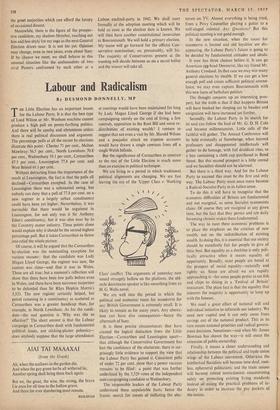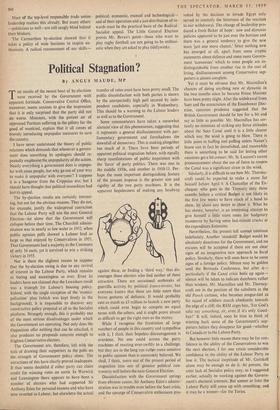Labour and Radicalism
By DESMOND DONNELLY, MP THE Little Election has an important lesson for the Labour Party. It is that the best type of Lord Wilton or Mr. Woolson machine cannot produce a high poll on penny-farthing politics. And there will be apathy and abstentions unless there is real political discussion and argument. The percentage polls at all the recent by-elections illustrate this point : Chester 71 per cent., Melton Mowbray 56.5 per cent., North Lewisham 70.8 per cent., Wednesbury 59.1 per cent., Carmarthen 87.5 per cent., Leamington 77.8 per cent. and West Bristol 61.1 per cent.
Without detracting from the importance of the result at Leamington, the fact is that the polls all declined—Carmarthen excepted. In the case of Leamington there was a substantial swing, but nobody can deny that a poll of 77.8 per cent, on a new register in a largely urban constituency could have been yet higher. Nevertheless, it was inevitable that there would be arguMent in Leamington, for not only was it Sir Anthony Eden's constituency, but it was also near by to the Coventry motor industry. These points alone would explain why it should be the second highest percentage poll. But it takes Carmarthen to throw into relief the whole picture.
Of course, it will be argued that the Carmarthen by-election was the outstanding exception for various reasons : that the candidate was Lady Megan Lloyd George, the register was new, the contest was close—and that it was in Wales. These are all true; but a moment's reflection will show that there have been low polls before even in Wales; and there have been narrower majorities to be defended than Sir Rhys Hopkin Morris's 3,333. The new register certainly helped, but petrol rationing in a constituency as scattered as Carmarthen was a greater handicap than, for example, in North Lewisham. As for the candi- date—the real question is 'Why was she so effective?' The short answer is that the Labour campaign in Carmarthen dealt with fundamental political issues, not sticking-plaster polemics— does anybody suppose that the large attendances at meetings would have been maintained for long by Lady Megan Lloyd George if she had been campaigning merely on the cost of living, a few controls, opposition to the Rent Bill and some re- _ distribution of existing wealth? I venture to suggest that not even a visit by Mr. Harold Wilson and a poujadist attack on expense accounts would have drawn a single cowman from off a single Welsh hillside.
But the significance of Carmarthen in contrast to the rest of the Little Election is much more than an exercise in political technique.
We are living in a period in which traditional political alignments are changing. We are fast leaving the era of the 'Upper Class v. Working Class' conflict. The arguments of yesterday now sound strangely hollow on the platform, the old- style doctrinaire speaker is like something from an H. G. Wells novel. '
We are well into the period in which the political and economic room for manceuvre for any British Government is extremely small. It is likely to remain so for many years. Any aberra- tion can have dire consequences—hence the aftermath of Suez.
It is these precise circumstances that have created the logical deduction from the Little Election--Carmarthen and Leamington apart— that although the Conservative Government has lost the confidence of the electorate, there is sur- prisingly little evidence to support the view that the Labour Party has gained it. Consistent polls of under 72 per cent, show that a power vacuum remains to be filled : a point that was further underlined by the 3,529 votes of the independent non-campaigning candidate at Wednesbury.
The responsible leaders of the Labour Party understand these unpalatable facts; hence the frantic search for means of titillating the elec- torate on TV. Almost everything is being tried, from a Privy Counsellor playing a guitar to a well-staged colonial Any Questions? But this political stunting is not good enough.
In the new situation, when the room for manoeuvre is limited and old loyalties are dis- appearing, the Labour Party's future is going to be decided by fundamental attitudes and ideals.
It now has three choices before it. It can go American egg-head Democrat, like my friend Mr. Anthony Crosland. In that case we may win many general elections by stealth. If we can get a low enough poll and create sufficient political somno- lence, we may even capture Bournemouth with this new form of bathchair politics.
The thought conjures up an interesting pros- pect, but the truth is that if that happens Britain will have booked her sleeping car to Sweden and emigration will have increased yet further.
Secondly, the Labour Party in its search for its soul can follow the lead of Mr. G. D. H. Cole and become millenniumists. Little cells of the faithful will gather. The Annual Conference will be held eventually at Stonehenge, when learned professors and disappointed intellectuals will gather to do homage, with full druidical rites, to a box containing a cloth cap purchased in Bond Street. But this second prospect is a little unreal and we Socialists should not be alarmed: But there is a third way. And for the Labour Party to succeed this must be the first and only way. The Labour Party must .once more become a Radical-Socialist Party in its fullest sense.
To do this it will have to recognise that the economic difficulties of Britain are fundamental and not marginal, as some Socialist economists claim. Of course they are marginal at any given time, but the fact that they persist and are daily becoming chronic makes them fundamental.
The way to meet these economic problems is to place the emphasis on the creation of new wealth, not on the redistribution of existing wealth. In doing this, it is essential that our society should be manifestly fair for people to give of their best. But equality as a doctrine is only poli- tically attractive when it means equality of opportunity. Broadly, most people are bored at the prospect of social equality—naturally and rightly so. Some are afraid we are rapidly approaching it—for some people prefer to eat fish and chips to dining in a 'Festival of Britain' restaurant. The plain fact is that the equality that interests the majority is opportunity to keep up with the Joneses.
We need a great effort of national will and individual initiative to refurnish our industry. We need new capital and it can only come from savings out of the national product. This in its turn means national priorities and radical govern- ment decisions. Sometimes—and when Mr. James Bowman has shown the way—it will mean the extension of public ownership.
Finally, it means a closer understanding and relationship between the political and trade union wings of the Labour movement. Otherwise the intellectual Socialists will become tone-deaf, root- less, ephemeral politicians; and the trade unions will become inbred restrictionists concentrating solely on protecting existing living standards instead of easing the practical problems of in- dustry in order to increase the pay packets of the nation. Most of the top-level responsible trade union leadership realises this already. But many others —politicians as well—are still snugly blind behind their blinkers.
The Carmarthen by-election showed that it takes a policy of wide horizons to inspire en- thusiasm. A radical reassessment of our skills— political, economic, manual and technological— and of their operation and a just distribution of re- wards must be the practical basis of the Radical- Socialist appeal. The Little General Election proves Mr. Bevan's point—those who want to play rugby football are not going to be enthusi- astic when they are asked to play tiddlywinks.



































 Previous page
Previous page